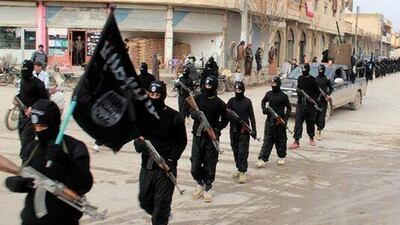Beirut // Al Qaeda severed ties with the Islamic State of Iraq and the Levant (Isil) on Monday, disavowing its connection to the most extreme rebel faction fighting in the Syria war.
In a public statement, Ayman Al Zawahiri, who took over as Al Qaeda’s leader following the death of Osama bin Laden, said his group had “no links” to Isil.
“We were not informed about its creation, nor counselled. Nor were we satisfied with it, rather we ordered it to stop. Isil is not a branch of Qaedat Al Jihad [Al Qaeda] and we have no organisational relationship with it,” he said.
The announcement confirmed a split that has been dividing hardline Islamist groups on the ground for some months, often violently.
In September, Jabhat Al Nusra, the official Al Qaeda affiliate in Syria, clashed with Isil in Syria’s northern Hasakeh province, although the exact details of what happened remain unclear as the groups are secretive.
But the disagreement between the two groups – both once considered Al Qaeda affiliates – broke into the open in April last year, when Abu Bakr Al Baghdadi, the head of Isil, tried to force a merger with Al Nusra and gain control over Al Qaeda’s Syria operations.
That move was rejected by Mohammad Al Jolani, Al Nusra's leader, who won the backing of Al Zawahiri in the dispute. It was a rare public spat in the ranks of Al Qaeda.
In the following months, tensions within rebel ranks continued to rise, with the moderate nationalists of the Free Syrian Army getting into violent confrontations with Isil.
Then, a month after its formation in November, the Islamic Front, an alliance of hardline Islamist rebel groups with much in common ideologically with Al Qaeda, also turned its guns on Isil.
While Isil has its roots in Iraq with foreign fighters who opposed US forces there, Al Nusra has a greater claim to being a Syrian home-grown movement, drawing most its members and supporters from inside the country.
Al Nusra has also proven more popular among civilians in areas under rebel control, seeking to win hearts and minds by distributing food and fuel, and taking a more pragmatic approach towards enforcing its brand of Islamic justice than Isil.
Although classified a “terrorist” organisation by the United States and Europe, Al Nusra is fairly well regarded across rebel ranks. While nationalist rebel commanders say they believe it does pose a long-term threat to aspirations for a democratic Syria, Al Nusra members have also shown themselves willing to debate points of law and administration, rather than rely on the rule of the gun, the method favoured by Isil.
International concern about Isil has been growing and on January 28 the Turkish air force carried out strikes against an Isil convoy inside Syria.
In the course of Syria’s uprising-turned-civil war, Isil has emerged as one of the most powerful rebel factions on the ground, seizing control of oilfields and consolidating its hold on territory, including Raqqa, the only provincial capital in rebel hands.
That Isil has openly turned Raqqa municipal offices into a headquarters, without coming under attack from forces loyal to President Bashar Al Assad, has fuelled suggestions that regime forces are in league with Isil in an attempt to subvert what began in March 2011 as a peaceful rebellion.
Fighting between the Islamic Front and Isil intensified in January, with the violence resulting in 1,400 dead in 20 days across Raqqa, Idleb and Aleppo provinces.
While the Islamic Front made early rapid advances against Isil, it pushed back and retook much of the territory it lost, highlighting its military effectiveness.
While the opposition fought amongst itself, regime forces were able to make headway in Aleppo.
psands@thenational.ae

